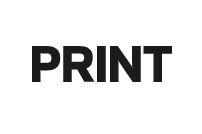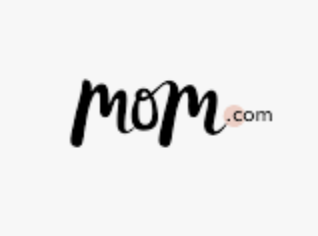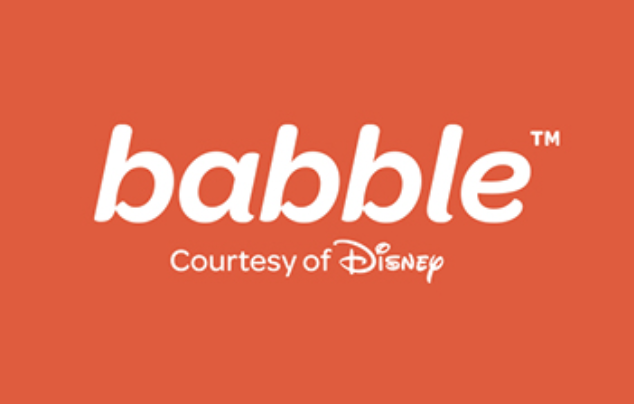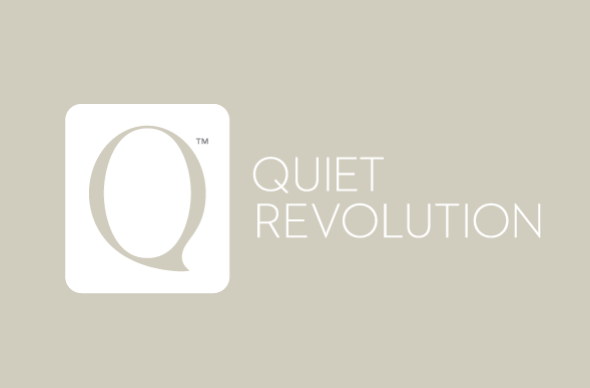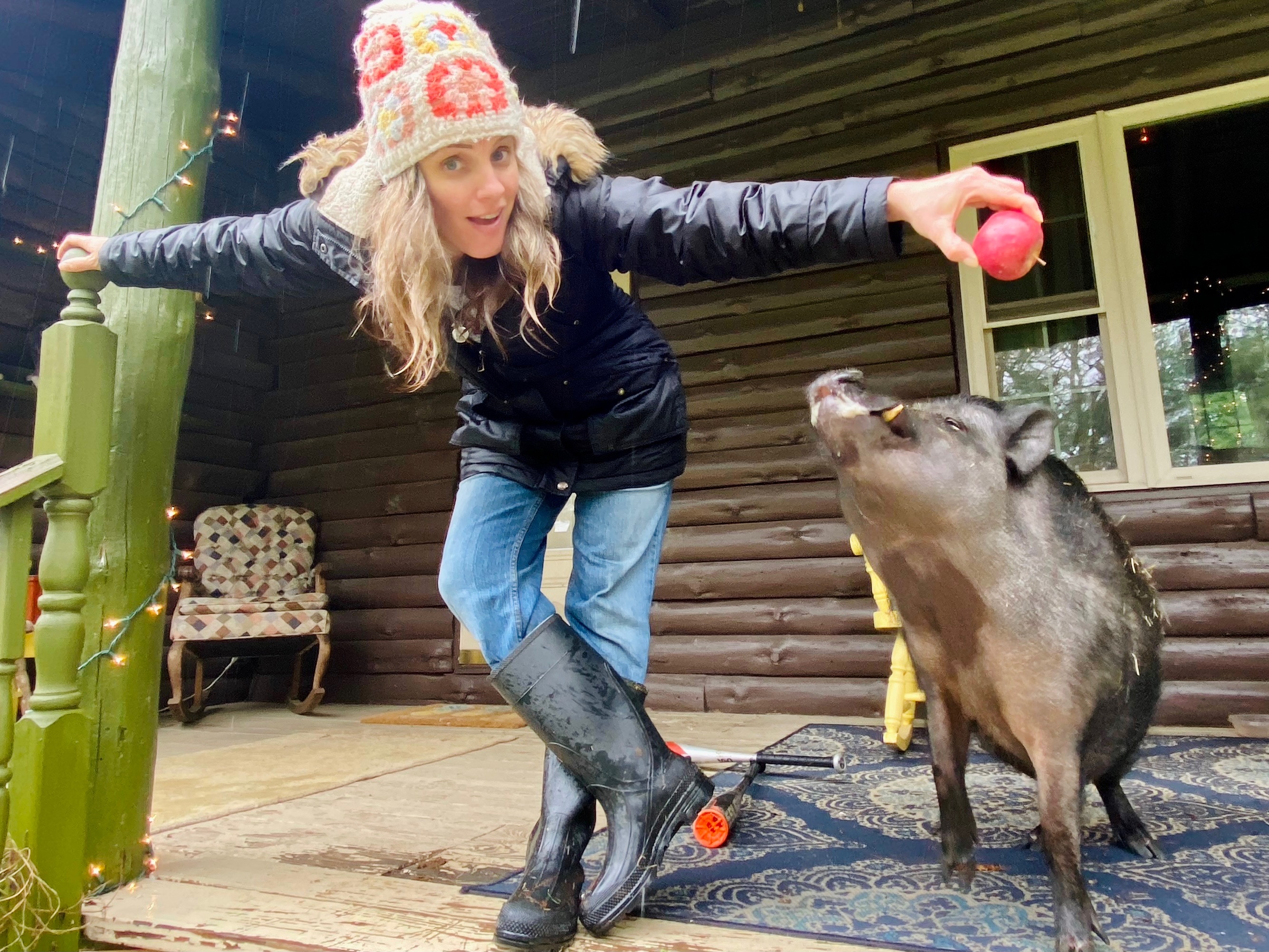
Hair has been a running theme in my life for as long as I can remember. My mom tells stories of strangers approaching her in grocery stores when I was as young as 3-years-old to compliment my long, blonde hair. So devout was her belief in my American girl good looks, she had me modeling at local malls before I started Kindergarten.
I have been wrapped in the security blanket of my long hair for four decades now barring one incident, when I was 36, empowered by Rooney Mara's portrayal of Girl With the Dragon Tattoo's Lisbeth Salander, I spontaneously grabbed a pair of dull scissors and, while my toddler babbled and weaved through my legs,
chopped off nearly a foot of hair. It scared the shit out of me, but that is precisely why I wanted to do it. I have a vivid memory of that empowerment leaking from my being as I read comments on a website dedicated to gossiping about bloggers. "Any woman behaving like this is clearly mentally ill" read one comment. "What a stupid thing to do for attention" said another. I had not yet learned the term "gaslight."
I have spent the five years since growing it all back.
Despite immediately smothering my brave yet brief foray into empowerment before allowing other women and my own mind to order me back into social submission, I have changed more in the years after sawing at that thick wad of hair than in my entire life leading up to that point.
I emerged from divorce battered and bruised and promptly set about finding myself. As cliche as it sounds, this was the first time in more than a decade when I could survey the world from a solo vantage point, think what I wanted without influence, and conduct my life on my terms and my terms alone. Not that my ex-husband dominated me in any way, just that in my case nearly a decade of togetherness with the same person severely eroded any individuality I earned prior to that union.
My divorce led me into the most intense period of studying in my life. Sexism, religion, racism - each area intersects with another over and over again. I've focused on luminaries whose words are worth more to me than any material wealth you could ever offer: James Baldwin, Audre Lord, Zora Neale Hurston, Roxanne Gay, Ibram X. Kendi, Christopher Hitchens, Glennon Doyle, Ta Nehisi Coates and Isabel Wilkerson whose masterpiece,
The Warmth of Other Suns, is required reading for every American. If you're serious about doing the work, start there and then move on to Kendi's
Stamped from the Beginning.
Podcasts like
Seeing White and MEN were crucial jumpstarts into a higher plane of consciousness. I've honed my Twitter feed until reading it feels like listening in on an incredible conversation between the world's top minds. I listen listen listen - ask questions if I dare - and listen listen listen some more. Twitter gives you instant access to these people and they often answer. It still blows my mind. And then I cross-check those answers and conversations with the published ruminations of other incredible thinkers and writers I admire. Facebook groups filled with generous women willing to answer even the most ignorant questions have also been invaluable. Read the right threads,
the right bloggers, pay attention.
Listen to Black women. They have always known the way, have always been the backbone of an America that has demeaned, excluded, and oppressed them and yet it is they who usually lead the fight against injustice. We have ignored them for centuries and are now paying the price. You either do the work or you don't. But I submit your life is ultimately meaningless if you choose to remain in the dark. And it
is a choice and a privilege, white people. Unlike for slaves,
whose hands were cut off or who were often lynched if caught with books, as it was illegal for them to read and write.
It has been a long, slow awakening, but my eyes are open. And yet the work continues for that is the point of existence. Never believe you know enough. Ceaselessly ask questions, seek answers then ask more questions. Don't let yourself plateau or believe your work is done. Keep applying what you learn to form yourself into the best version of you and use that version of you to ask better questions and always, always teach what you've learned to your children and other people you're lucky enough to influence.
White people have a lot of work to do and I don't rightly know that it will be realized in my lifetime. If that statement makes you uncomfortable or defensive, that's an indication that you, especially, are not doing the work. You can roll your eyes at rhetoric like this, remain uncomfortable or even go back to sleep and conjure up that hypnotic American dream that's kept us complacent and complicit or you can roll up your sleeves and choose to recognize the propaganda that has hidden the truth about a country created on lies, slavery, supremacy, murder, sexism and racism, all in the service of white power.
We were taught to recognize racism as individual acts of meanness, of KKK members burning crosses, yelling at Black people at lunch counters, whites only drinking fountains or of slavery as a whole, and we naively believed this problem was solved when Black people were given equal rights. That's why we understandably get so offended when called racist. But, in the same way that the Emancipation Proclamation did not actually free all slaves, The Civil Rights Act was merely a technicality of law that did not immediately create justice for Black people. Yes, technically Blacks were given equal rights, but nearly every governmental system has been created to hinder Black people from achieving the same things as white people. Some of those laws were created before the Civil Rights Act and many created after and they're all having the same devastating impact on Black lives.
If you ever wondered what you would've done if you lived in Germany during the rise of the Third Reich, take a look at your level of interest in Black lives and you'll have your answer. Racism in America has caused millions upon millions of deaths that are now happening before our very eyes via cameras recording police brutality and shameful public harassment at the hands of racist white people. And this is just the physical collateral. What about the mass genocide, the utter demoralization of the hearts and minds of an entire people? Yet the majority of the white population remains largely uninterested.
"
Americans don't know their history and history is not something you study, history is something you achieve and you've go to know what happened if you intend to make another move and Americans don't know what happened. Not yet."
-James Baldwin, 19-fucking-63
Ultimately, you can go on about your life blindly believing the propaganda those in power need you to believe to remain in power or brush the defensiveness aside and get to work figuring out what an increasing number of people are discussing when they talk about the white problem. Begin with the understanding that when we're being called racist it's because we continue to blindly support systems and ideologies that are rooted in racist ideas, not that we're burning crosses in someone's front yard.
Racism does not start with hate and ignorance. Brilliant, powerful men and women create racist ideas to justify their racist policies and then place blame for the resulting racial disparities onto Black people for somehow being inferior or lazy, instead of blaming the policies. Our ignorance and hate didn't come first, it came last. The racist discrimination and policies create the ignorance, fear and hatred. Understand the policies, why they were created and what they've accomplished and you'll know why you're being called a racist when you firmly believe in your heart that all people are equal. I'll say it one more time: The definition of racism in this capacity is NOT an overt act of meanness and anger toward another individual, although there is plenty of that, it is the policies and their effects that are weaved throughout our laws and lives that we have always accepted without question.
*****
She doesn't remember it, I'm certain, and she was years younger than I am now when she said it, but my sweet mom once casually told a teenage me that men are more attracted to women with long, blonde hair. The comment has stuck with me, obviously, as I have pretty much always had long, blonde hair, just like my mom. Both of us grew up in the heart of Utah, daughters in a long line of Mormon ancestors, including one of Joseph Smith's polygamist wives.
No matter where we're born all us women are born into patriarchy, but Mormonism, and the men in power, enjoy a particularly savage brand of male, white supremacy that strips a woman of value apart from her husband or children. The area I grew up in, Provo/Orem (85% Mormon) in a state where nearly 90% of its population identifies as white - is brimming with Colgate commercial-worthy smiling, blonde-haired, tanned white women with ready access to Botox and plastic surgery. It is unsurprising that
Salt Lake City has more plastic surgeons per capita than Los Angeles.
Not only does the Mormon church quietly force an unrealistic standard of perfection both spiritually, morally and physically on its members via guilt and shame - either the Opioid or suicide epidemic ravaging the state is evidence of that - but young women coming of age in the Mormon church are exposed to widespread, systemic sexism from the instance of their birth.
The church has organized itself around the male sex, women are simply compliments to the men who hold positions of power. Boys are conferred more religious power than their mothers when they are given the Priesthood, which is essentially "
the power and authority of God," at just 12-years-old. Thus begins a journey whereupon these young boys move up the ranks until, if they choose, they reach the highest level, apostle, and become counsel to the Prophet, the leader of the church. Women are not offered this option.
The all-male hierarchy of the church has given women specific roles involving women and children. As men are doing the organizing, via visions from god, it shouldn't surprise anyone that
men, 99% white, have, and will likely always be in control at the highest levels all the way down to the lowest levels. There are no women leaders of Mormon "wards," which are the highly structured equivalent of Catholic parishes. Just as the folks in charge of the American government have a penchant for creating laws that keep themselves in power, Mormon men are very nearly deified by the powers and duties bestowed upon them... by themselves.
A woman's place is in the home rearing the children. Just as they were forced by societal progression in the late 70's to allow Black men into their inner ranks, in recent years
Mormon leaders have half-heartedly tried to appease their female contingency while
quietly ousting any feminists who dare challenge norms, including just wanting to
wear pants to church.
No matter the tiny, meatless bones the church attempts to throw at devout female members who question overtly sexist ideologies, women must always abide by the righteous counsel of their husbands. If you disagree with your husband,
even if the point of disagreement involves his habit of beating you into god-ordained submission, leaders encourage you to pray about it. If you return from prayer with a "wrong" response, you're usually told you are still closing your heart to god.
Twenty years after leaving the church, I have clearly not fully recovered from Mormonism. I realized this a few months ago when I was watching a documentary,
Believer, about the church's stance on LGBTQ members produced by Imagine Dragons frontman and Mormon, Dan Reynolds. A scene in the movie shows one of the leaders of the church, probably Dallin Oaks (
I've tangled with him before about, ironically, racism) talking about its stance on gay members. The video of that old, white man speaking words of shame to marginalized people who would often rather take their own lives than be themselves caused my guts to roil hotly and my chest burn in anger. I began shaking and sobbing with rage and trauma. I couldn't stop. My man had to pause the movie and quietly rub my back until I could get my shit together. That was my experience as a young girl in that church. No matter
their moral character, older, white men were the architects of my self worth and my sexuality.
Slut. Whore. Shame. Guilt.
I was none of these things, of course, but the church and its members created a mental prison of guilt and anguish for even the most minor of transgressions that many people I love, including family members very close to me, will never escape. Who would these beautiful souls have been without this institution gaining control of their brains? For that matter, what would America be without its institutions gaining control of our brains?
This comprehensive, religious and governmental sexist attack on my mind about gender roles has played a large part in a lifelong compulsion to please men or appear attractive to men or value myself based on a man's interest in me. Mormon doctrine is simply an intense microcosm of American society. Religion or no, every woman in this country has grown up assaulted by headlines informing us how to appear more attractive to men or what men want in a woman. At 41, I can finally, honestly say that I don't give a fuck what men want in a woman. I just want to be who I am without the constant, crushing need to modulate my looks and personality to fit whatever is currently pleasing to society(men).
I used to think that life was a constant quest to learn, and it is that, yes, but I'm finding that much of the learning comes from unlearning everything you thought you knew.
The unlearning is as important as the learning. If you remember nothing else, remember that. The only way to unlearn is to question
everything. Upend your mind, dump it out, examine the contents and very carefully choose what you place back inside.
As I attempt to unlearn what Mormon and American culture has taught me about the right and proper ways to be a woman I realize that my hair plays a larger role in the conditioning than I ever thought. The more I've pondered it the more my hair has started to suffocate me. I think of the thousands of dollars I've spent in its servitude, the hours designated to shaping it into what I perceived it should be, the unhappiness I've felt when it doesn't look great and even the happiness I feel when it looks good. My mood should never hinge on my hair, is what I'm saying. The only way to free my mind and my soul is to get rid of it altogether. I'm terrified, but I'm excited. I have subconsciously measured my beauty by my hair for so long it's like an arm or a leg. I want - no -
need the liberation and introspection and life lessons that will inevitably come from shedding this hair that I frequently allow to define me.
After nearly a year of deliberation, I have decided to shave my head. It may seem drastic to you. You may be conditioned by society to think I looked way better with long hair and that's okay. I'm sure I'll have lots of similar freak-out moments when I think the same thing because I am you and you are me, that is to say that we are victims of the same cultural notions about women and women's beauty.
Hair is powerful. We ascribe such meaning to it whether it's about ourselves or others. What we do with it says so much about who we are, unfortunately. I refuse to let myself be a prisoner of that attitude any longer. So I'm breaking up with my hair. As mentioned, I'd been toying with the notion for a while but actively began to consider it in February when I saw this video of Emma Gonzalez shaving her head in a matter of seconds with the caption "
when you've got work to do but your hair's gettin too long."
I follow Cheryl Strayed on Instagram. The woman who wrote Wild, the book about hiking the Pacific Crest Trail alone. A couple weeks ago
she wrote about putting on her swimsuit and doing laps in a hotel pool and choosing not to care what anyone thought about what she looks like in her swimsuit. "I thought about how simple the deepest revolutions tend to be. Sometimes it’s just saying no. Sometimes it’s just saying okay. Sometimes it’s just saying I am not sorry.
This is my body and I do not and will not aspire to your gaze."
Emma's practical notions regarding hair collided with Cheryl's philosophical stance and exploded like 4th of July fireworks in my mind. I'm tired of being a servant of my hair. Products, cuts, colors, styling - done. I no longer want to aspire to men's gaze. My fella digs it and, even if he didn't, I don't care. I'm not attracted to anyone who isn't attracted to the real me.
I'm turning 42 in a few months, a time when most women began to flirt with Botox and expensive wrinkle creams. A time when many women begin to feel invisible because society has less value for us even though these are the years in which we come into our power, as any woman living this decade can tell you. So I'm going to exterminate the one physical feature that has supported me all these years? Yeah. Yeah I am. I am fucking terrified. I have already lived out the reactions of certain people in my mind. The Oh-my-god-what-did-you-do-your-hair-was-so-pretty contingency. I tested the water by telling a few of them what I wanted to do and the reaction was universal: Don't do it.
I have to do it. I want to learn the lessons on the other side. It isn't just the liberation I'm after. I want to know how much of a role this long, blonde security blanket has played in my personality. I need to figure out who I am without it. When I look in the mirror and feel naked and maybe even unattractive without all that hair - as I've been conditioned to feel - I need to walk into that fear and pain and figure out why I've allowed my value to hinge on a physical attribute that other people have defined as beautiful.
This is my body and I do not and will not aspire to your gaze.

 My mom used to watch this TV show called Thirtysomething. She was thirty-something at the time which would put me at 11 or 12. The people on the show, who seemed positively ancient to me, always appeared to be angry or crying as melodramatic pop music swelled in the background and it all just made me not want to grow up. Like, yuck. What a complicated drag it all is.
My mom used to watch this TV show called Thirtysomething. She was thirty-something at the time which would put me at 11 or 12. The people on the show, who seemed positively ancient to me, always appeared to be angry or crying as melodramatic pop music swelled in the background and it all just made me not want to grow up. Like, yuck. What a complicated drag it all is.
 Dec 16, 2019 |
Dec 16, 2019 |  3 Comments
3 Comments 